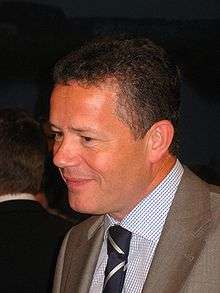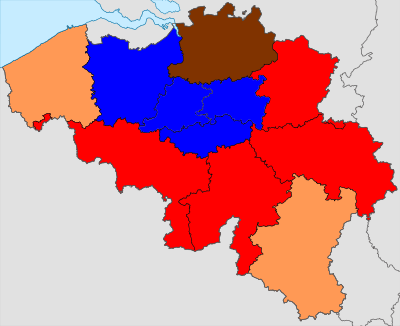Belgian federal election, 2003
| | |||||||||||||||||||||||||||||||||||||||||||||||||||||||||||||||||||||||||||||||||||||||||||||||||||||||||||||||||||||||
| |||||||||||||||||||||||||||||||||||||||||||||||||||||||||||||||||||||||||||||||||||||||||||||||||||||||||||||||||||||||
| |||||||||||||||||||||||||||||||||||||||||||||||||||||||||||||||||||||||||||||||||||||||||||||||||||||||||||||||||||||||
|
| |||||||||||||||||||||||||||||||||||||||||||||||||||||||||||||||||||||||||||||||||||||||||||||||||||||||||||||||||||||||
| Colours denote the winning party in each electoral district, as shown in the table of results. | |||||||||||||||||||||||||||||||||||||||||||||||||||||||||||||||||||||||||||||||||||||||||||||||||||||||||||||||||||||||
| |||||||||||||||||||||||||||||||||||||||||||||||||||||||||||||||||||||||||||||||||||||||||||||||||||||||||||||||||||||||
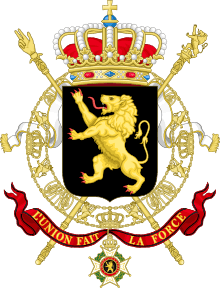 |
| This article is part of a series on the politics and government of Belgium |
| Constitution |
|
| Foreign relations |
The 18 May 2003 Belgian federal elections were the first Belgian elections to be held under a new electoral code. One of the novelties was an electoral threshold of 5%, which has cost many seats to the N-VA and the Green parties, Ecolo and Agalev. The Belgian Socialists recovered well; the liberal and nationalist parties increased their vote as well.
The Flemish Greens lost all their seats. The Greens were attacked on two fronts: some, including their coalition partners, accused them of being too fundamentalist, while others said that they had betrayed their ideals. The resignation of a Walloon green minister (Isabelle Durant), one week before the elections, probably didn't do them much good either. Although it was predicted in some opinion polls, the gains of the Front National were surprising, considering that it seldom appeared in the media. The most important trend was the recovery of the Flemish social-democrats, led by the popular (some would say populist) Steve Stevaert. The fact that Elio Di Rupo was learning Dutch caused rumours that he hoped to become Prime Minister, if the social-democrats would turn out to be the largest political family.
Themes that probably influenced the election results in some way or another were the government's opposition to the 2003 invasion of Iraq, the controversy around the nuisance around the airport of Zaventem, the controversy surrounding the banning of tobacco publicity, and unemployment. But a general dominating theme was lacking.
Results
| ← 1999 • 2003 • 2007 → | |||||||||
| Party | Main ideology | Leader(s) | Votes | % | +/– | E.c. % | Seats | +/– | |
|---|---|---|---|---|---|---|---|---|---|
| Flemish Liberals and Democrats (VLD) | Liberalism | Karel De Gucht | 1,009,223 | 15.36 | 1.1 |
25.9 | 25 | 2 | |
| Socialist Party–Differently (SP.A) + Spirit (SPIRIT) | Social democracy | Steve Stevaert | 979,750 | 14.91 | 5.4 |
24.9 | 23 | 9 | |
| Christian Democratic & Flemish (CD&V) | Christian democracy | Stefaan De Clerck | 870,749 | 13.25 | 0.84 |
25.3 | 21 | 1 | |
| Socialist Party (PS) | Social democracy | Elio Di Rupo | 855,992 | 13.02 | 2.8 |
36.4 | 25 | 6 | |
| Flemish Block (VB) | Flemish nationalism | Frank Vanhecke | 767,605 | 11.59 | 1.7 |
18.2 | 18 | 3 | |
| Reformist Movement (MR) | Liberalism | Antoine Duquesne | 748,954 | 11.40 | 1.3 |
28.4 | 24 | 6 | |
| Humanist Democratic Centre (CDH) | Christian democracy | Joëlle Milquet | 359,660 | 5.47 | 0.4 |
15.4 | 8 | 2 | |
| New Flemish Alliance (N-VA) | Flemish nationalism | Geert Bourgeois | 201,399 | 3.06 | 2.5 |
1 | 9 | ||
| Confederated Ecologists (ECOLO) | Green politics | 201,123 | 3.06 | 4.3 |
8.5 | 4 | 7 | ||
| National Front (FN) | Nationalism | Daniel Féret | 130,012 | 1.98 | 0.5 |
5.6 | 1 | 0 | |
| Living Differently (AGALEV) | Green politics | Jos Geysels | 162,205 | 2.47 | 3.5 |
3.9 | 0 | 9 | |
| Vivant (VIVANT) | Social liberalism | Roland Duchâtelet | 81,337 | 1.20 | 0.9 |
— | 0 | 0 | |
| Others (parties that received less than 1% of the national vote) | 204,180 | 3.10 | — | — | — | — | |||
| Valid votes | 6,572,189 | 94.74 | |||||||
| Blank and invalid votes | 364,612 | 5.26 | |||||||
| Totals | 6,936,801 | 100.00 | — | — | 150 | 0 | |||
| Electorate and voter turnout | 7,570,637 | 91.63 | |||||||
| Source: Federal Portal − Chamber Elections 2003. Notes: | |||||||||
| Party | Votes | +/– | % | +/– | Seats | +/– | |||
|---|---|---|---|---|---|---|---|---|---|
| Socialist Party–Different / Spirit (Socialistische Partij–Anders / Spirit) | 1,013,560 | 462,903 |
15.47 | 6.59 |
7 | 3 | |||
| Flemish Liberals and Democrats (Vlaamse Liberalen en Democraten) | 1,007,868 | 55,752 |
15.38 | 0.01 |
7 | 1 | |||
| Christian Democratic and Flemish (Christen-Democratisch en Vlaams) | 832,849 | 80,659 |
12.71 | 2.03 |
6 | 0 | |||
| Socialist Party (Parti Socialiste) | 840,908 | 243,018 |
12.84 | 3.19 |
6 | 2 | |||
| Reformist Movement (Mouvement Réformateur) | 795,757 | 140,796 |
12.15 | 1.58 |
5 | 0 | |||
| Flemish Block (Vlaams Blok) | 741,940 | 158,732 |
11.32 | 1.91 |
5 | 1 | |||
| Humanist Democratic Centre (Centre Démocrate Humaniste) | 362,705 | 11,297 |
5.54 | 0.49 |
2 | 1 | |||
| New-Flemish Alliance (Nieuw-Vlaamse Alliantie) | 200,273 | 117,557 |
3.06 | 2.0 |
0 | 2 | |||
| Ecolo | 208,868 | 249,790 |
3.19 | 4.21 |
1 | 2 | |||
| Agalev | 161,024 | 277,907 |
2.46 | 4.62 |
0 | 3 | |||
| National Front (Front National) | 147,305 | 54,381 |
2.25 | 0.75 |
1 | 1 | |||
| Vivant (total) | 86,723 | 36,775 |
1.3 | 0.7 |
– | – | |||
| Others | 151,731 | — | 2.3 | — | — | — | |||
| Total (turnout 94.4 %) | 6,551,511 | 100 | 40 | ||||||
| Source: Verkiezingen 2003. | |||||||||
The 1999 data are resp. SP instead of SPA-S, CVP instead of CD&V, PRL-FDF-MCC alliance instead of MR, PSC instead of cdH and Volksunie instead of N-VA.
Further reading
- Fitzmaurice, John (January 2004). "Belgium Stays 'Purple': The 2003 Federal Election". West European Politics. 27 (1): 146–156. doi:10.1080/01402380412331280843.
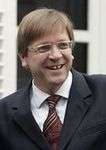

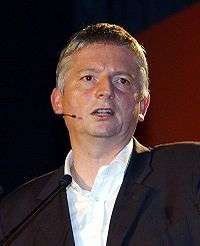
_cropped.jpg)
